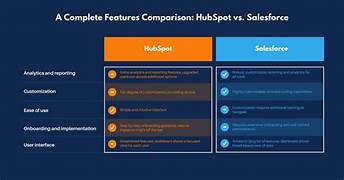HubSpot began as a marketing automation solution tailored for small businesses, but it has since grown into a comprehensive Enterprise CRM, integrating marketing, sales, CMS, and service functionalities. While Salesforce continues to be a popular choice for CRM, more teams are increasingly turning to HubSpot for its marketing automation capabilities.
HubSpot is a leading platform in CRM, marketing, sales, and customer service software, with a clear mission: to empower companies to optimize their sales processes and drive growth. HubSpot offers a range of resources centered around its five main products or “Hubs,” with the Marketing Hub and Sales Hub being the most prominent.
HubSpot vs. Salesforce: Key Differences
Salesforce is known for its robust reporting and extensive customization options. In contrast, HubSpot offers a smoother learning curve, a more intuitive interface, and a comprehensive suite of marketing and sales tools, all available at an accessible price point, including a free tier.
Integrating HubSpot with Salesforce
Integrating HubSpot with Salesforce allows you to streamline operations, creating a seamless and efficient connection between the two platforms without the need for complex technical setup.
Key Benefits of HubSpot-Salesforce Integration:
- Synchronization of Marketing and Sales Systems: Ensure that your marketing and sales teams are aligned by keeping their systems in sync.
- Lead Intelligence for Sales Teams: Equip your sales team with valuable insights into lead behavior, such as email opens, form submissions, and website activity.
- Data-Driven Decision Making: Use comprehensive insights to make informed decisions.
- Efficient Data Management: Manage and enrich your business data seamlessly.
Enhanced Data Management
The HubSpot-Salesforce integration simplifies and accelerates data management by eliminating manual data transfers and reducing the risk of errors. Syncing all relevant business data to HubSpot in just a few clicks provides deep insights into customer interactions and preferences, enabling you to deliver personalized experiences that boost engagement and foster customer loyalty.
Empowering Sales Teams
The integration enables seamless bi-directional synchronization, giving your sales team critical lead intelligence. By customizing record syncing and providing lead scores from HubSpot to Salesforce, sales teams can prioritize their outreach efforts more effectively, ultimately leading to increased deal closures.
Bridging the Gap Between Marketing and Sales
Close the gap between marketing and sales by using Salesforce data to personalize emails, segment databases, and send emails on behalf of sales representatives. The integration eliminates the need for manual exporting and importing of lists and campaign responses, while also allowing you to track revenue from closed-won deals in HubSpot, attributing campaigns directly to the revenue they generate.













